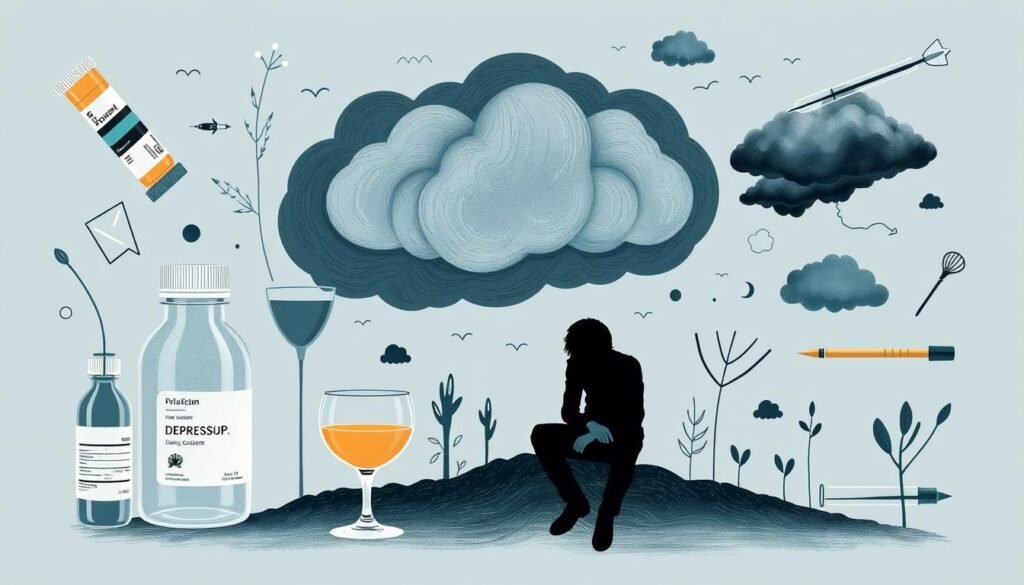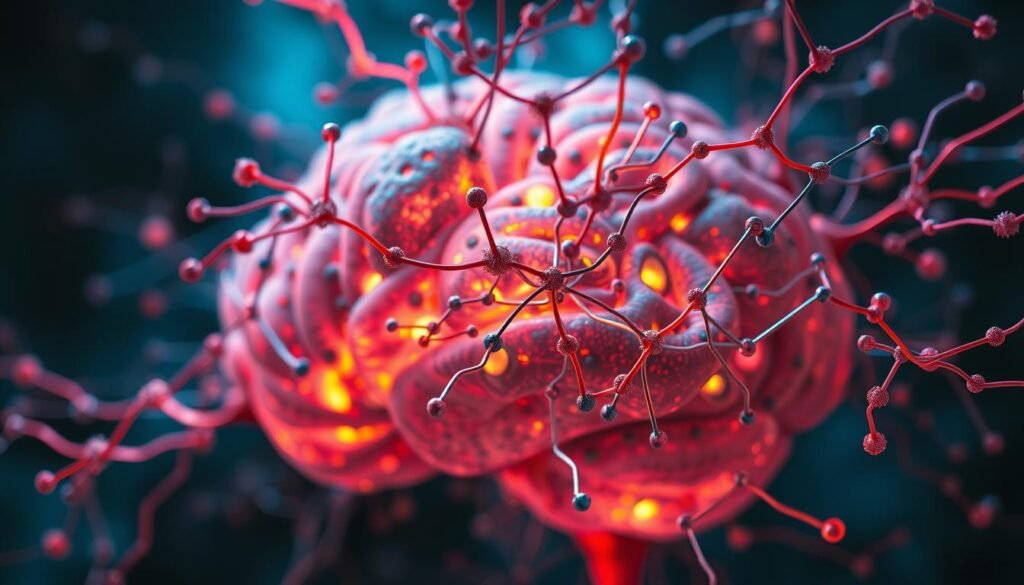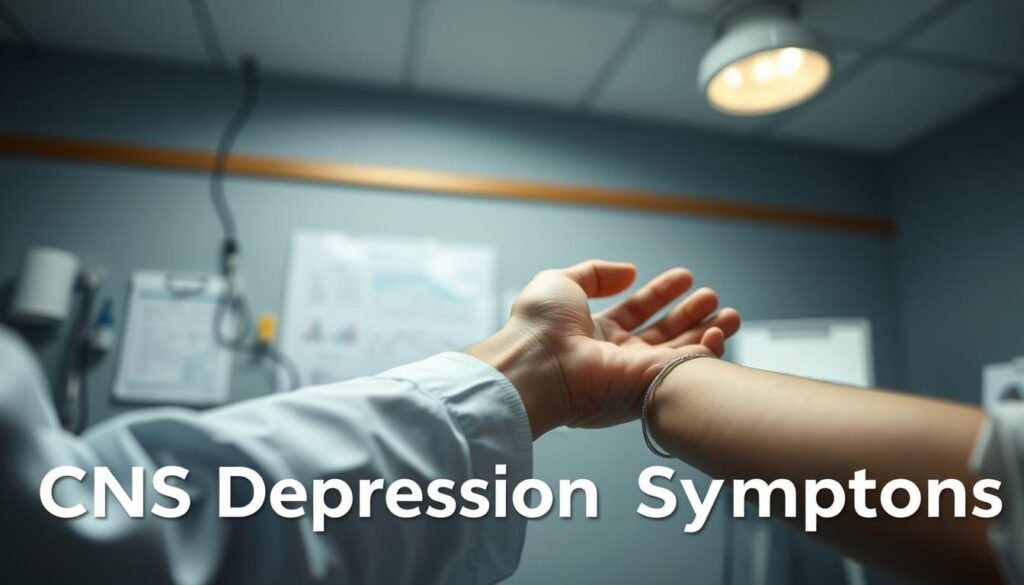Have you ever doubted if your tiredness or confusion was accurate? These feelings might be part of a bigger issue called CNS depression. It’s important to know about this condition, as it can greatly affect our daily life and overall health. CNS depression slows down the brain’s work, affecting important body functions. This can be quite dangerous.
Treatment options are available, so knowing the signs of CNS depression helps manage it and aids recovery. Substances like alcohol, barbiturates, benzodiazepines, and opioids greatly contribute to CNS depression. It’s crucial to understand their effects.
Learning more about treating CNS depression is key. It’s also important to understand its subtle signs. This knowledge prepares you to talk with doctors about handling CNS depression and choosing the right treatment. If you want to dig deeper, resources like central nervous system depressants offer lots of info on this topic.
Key Takeaways
- CNS depression results from the central nervous system slowing down, affecting vital bodily functions.
- Common substances implicated in CNS depression include alcohol, barbiturates, benzodiazepines, and opioids.
- Recognizing the symptoms of CNS depression is essential for effective management and treatment.
- Identifying the underlying causes of CNS depression can assist in tailoring treatment options.
- Seeking medical help is crucial for both diagnosis and managing withdrawal symptoms associated with CNS depressants.
What is CNS Depression?
CNS depression is when the body’s nerve system slows down. It affects the central nervous system, which manages important tasks like breathing and heart rate. Knowing about CNS depression is key because it can happen for many reasons.
Alcohol, opioids, and benzodiazepines are common substances that can slow the nervous system. For example, GHB can cause strong sleepiness. This increases the chance of taking too much by accident. Studies show GHB can slow the nervous system more than some other drugs.
Health issues can also lead to CNS depression. Taking medication incorrectly can make it worse. It’s important to know who might be at risk. This helps in preventing the condition effectively.
| Substance Type | Common CNS Depressant Examples | Potential Risks |
|---|---|---|
| Alcohol | Beer, wine, spirits | Impaired coordination, overdose |
| Opioids | Oxycodone, morphine, fentanyl | Dependence, respiratory failure |
| Benzodiazepines | Diazepam, clonazepam | Dependence, overdose risk |
| Barbiturates | Pentobarbital, phenobarbital | High overdose potential |
Learning about CNS depression helps people get medical advice and prevention. This is crucial for those who might be affected by these drugs or conditions.
Signs and Symptoms of CNS Depression
It’s key to spot signs and symptoms of CNS depression early. CNS depressants carry risks from discomfort to serious health issues. These are seen as either mild or severe symptoms.
Mild Symptoms
Mild symptoms slowly show up and might include:
- Lack of coordination
- Slurred speech
- Dizziness
- Drowsiness
- Dry mouth
They suggest the brain is working more slowly. This can make daily tasks hard. But, even if mild, these symptoms are important to notice.
Severe Symptoms
Severe symptoms mean a serious condition needing quick help. They include:
- Significantly slowed heart rate
- Unresponsiveness
- Extreme confusion
- Reduced breathing rate
- Coma
These severe symptoms can be deadly. People with these symptoms need to get emergency care fast to avoid deadly outcomes.
| Symptom Severity | Mild Symptoms | Severe Symptoms |
|---|---|---|
| Examples | Lack of coordination, dizziness | Significantly slowed heart rate, coma |
| Immediate Risk | Low risk; caution advised | High risk; medical attention required |
| Long-term Effects | Potential for increased dependence | Severe health complications, possible death |
Common Causes of CNS Depression
It’s important to know why CNS depression happens for the best care and handling. The reasons can be from substances or not related to drugs at all. Both play a big role in this serious issue.
Substance-Related Causes
Substance misuse is a major cause of CNS depression. It involves drugs that slow down brain activity. This includes items like alcohol, opioids, and medicines for anxiety or sleep. For example, medicament like Valium and Xanax are often used for these issues.
These drugs work by making the brain more relaxed. However, if not used correctly, they can lead to problems like sleepiness and slower breathing. When misused, they can have serious side effects.
About 7% of people in America use CNS depressants. This is worrying because it’s linked to more deaths from overdoses. If used for too long, people might need more of the drug to feel its effect. This can lead to addiction and withdrawal issues. Adding alcohol into the mix increases danger, possibly leading to death. To understand more about how opioids cause CNS depression, check this source.
Non-Drug Related Causes
Some CNS depression issues don’t involve drugs. Instead, they stem from health problems. Diseases like diabetes, strokes, and brain injuries can make it worse. They affect how the brain manages vital body functions.
The elderly are especially at risk. This is because of their age, health history, and the medicines they use. Older people process drugs like benzodiazepines slower. This can make side effects worse, such as poor decision-making and a higher chance of falling. Understanding these non-drug causes helps doctors find better ways to prevent CNS depression.

Understanding Neurotransmitter Imbalance in CNS Depression
Neurotransmitter imbalance is key in CNS depression. It often shows through imbalances in key neurotransmitters like GABA and serotonin. Both are crucial because they affect our emotions and mental health.
Role of GABA
GABA is the brain’s main inhibitory neurotransmitter. It helps lower brain activity and maintain calm. When GABA levels are high, we feel relaxed. If they’re low, anxiety can increase, making CNS depression worse. Balancing GABA levels is vital for mental well-being.
Impact of Serotonin Deficiency
Serotonin is also vital for mood control. Low serotonin can lead to depression and symptoms like irritability and sadness. It can make someone lose interest in life. Treating neurotransmitter imbalance is crucial. Strategies include psychotherapy, changing your lifestyle, and medications. To learn more, check out this resource.

| Neurotransmitter | Function | Impact of Imbalance |
|---|---|---|
| GABA | Inhibitory neurotransmitter that promotes relaxation | Increased anxiety and excitability if levels are low |
| Serotonin | Mood regulation and emotional stability | Symptoms of depression and anxiety when deficient |
Diagnosis and Testing for CNS Depression
Diagnosing CNS depression starts with a detailed check to see how a patient is feeling and functioning. An interview helps doctors understand the patient’s history and their current symptoms. It is important to correctly identify CNS depression for effective treatment.
Medical Evaluations
Medical checks are key in diagnosing CNS depression. Doctors may do a cognitive assessment for CNS depression to see how the patient’s mind is working. These check-ups look at memory, focus, and how well one can think. Spotting other medical issues that look like depression is crucial for proper treatment. Getting the diagnosis right early helps make treatment more successful. For more on depression diagnosis, check out this detailed guide here.
Blood and Urine Tests
Blood and urine tests are crucial in pinpointing CNS depression. These CNS depression tests check for drugs or toxins that might be causing the symptoms. This helps doctors make a treatment plan just for you. Together with medical evaluations, these tests give a full picture of your health. They help in treating CNS depression effectively, improving life quality. Studies show combining medication and therapy works well in fighting depression (source).

Treatment Options for CNS Depression
CNS depression affects how well we do everyday things. There are many treatments to help manage it. These include medication, therapy, and changes in how we live. Knowing about these can help people feel better.
Medications
Medicines for CNS depression include antidepressants and drugs for anxiety. Benzodiazepines are common for treating anxiety or panic. Yet, these medicines need careful oversight. This is because they can lead to dependence or make symptoms worse. Doctors must watch how patients use them closely.
Psychotherapy and Counseling
Therapy is also key in treating CNS depression. Techniques like cognitive behavioral therapy (CBT) tackle the root psychological problems. Therapy offers support and helps people find ways to cope. It improves emotional health overall.
Lifestyle Changes
Changing how we live can make a big difference. Doing regular exercise, eating well, and managing stress help a lot. Activities that help us relax and connect with others boost our mental health. These changes help lower symptoms and can prevent them from coming back.
| Treatment Option | Description | Considerations |
|---|---|---|
| CNS Depression Medications | Medications like benzodiazepines and antidepressants that target anxiety, panic disorders, and seizures. | Require careful monitoring to avoid dependency. |
| Psychotherapy | Cognitive behavioral therapy and counseling to tackle psychological issues increasing depression. | Provides coping strategies and emotional support. |
| Lifestyle Changes | Incorporating exercise, a healthy diet, and stress management methods. | Support long-term mental health and reduce risk of relapse. |
Long-Term Effects of CNS Depression
Long-term CNS depression can lead to serious health problems, such as dependence. People often turn to CNS depressants to feel normal. Dependence on these substances can cause both physical and mental issues. This leads many to get help from rehab to break free.
Potential for Dependence
Prolonged use of CNS depressants raises the risk of becoming dependent. Every day, 128 Americans die from opioid overdoses. This shows how serious this issue is. Dependence can develop quickly, even with regular use of alcohol or sleep aids like Nyquil. This can lead to long-term problems like headaches and memory loss.
Impact on Brain Chemistry
Continuous CNS depression alters brain chemistry, affecting mental health. It can upset the balance of neurotransmitters, which affects thinking and memory. Research links long-term use of these depressants to higher death rates. Cognitive functioning is a key factor in predicting mortality rates, highlighting the need for a healthy brain. Withdrawal can last up to 24 months, making recovery challenging.
| Substance | Daily Deaths (Opioid Overdose) | Potential Long-Term Effects |
|---|---|---|
| Opioids | 128 | CNS depression dependence, cognitive impairment |
| Alcohol | 128 | Memory loss, potential for addiction |
| Nyquil (antihistamine) | N/A | Headaches, forgetfulness |
Conclusion
Understanding CNS depression is key for managing it well. It has a range of symptoms, from mild to severe. Knowing the difference is crucial for fast treatment.
The disorder is not just about the signs we see. It also involves brain chemistry issues that contribute to it.
Dealing with CNS depression means using many approaches. This includes medications, therapy, and changing some lifestyle habits. For mothers using codeine, following safety advice helps. It leads to less sedation in babies and better breastfeeding.
These facts show how key education and making informed choices are in fighting CNS depression.
Knowing the long-term effects of CNS depression helps in getting better care. Watching for cognitive decline and medication use is important. With the right plans, people can manage their symptoms better.
This improves their life quality. It shows that understanding and managing CNS depression is basic for recovery and staying healthy long-term.